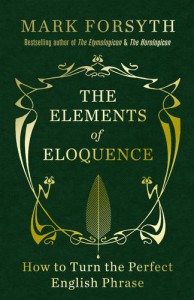Loving rhetoric


Marvelous! For a writer like me, without a formal writing education and largely self-taught, this book is a must. It talks about the rules of rhetoric – the rules for creating a memorable phrase. A writer must follow those rules, those rigid formulas, if she wants her writing to sound good, to invoke emotions, to inspire convictions. Those rules are called figures of rhetoric.
Forsyth explains the rules in simple words, not once resorting to the incomprehensible linguistic vernacular. Well, except for their Greek or Latin names, but they surely don't count.
He offers tons of examples, many of them from Shakespeare and other classics. He examines the history of those rules and their usage over the centuries, from ancient Greeks and the Bible to now. He shows that those rules can be learned. It doesn’t take a genius. It takes determination and practice. I can learn those rules. So can you, and the knowledge makes them less scary. In a way, this book is a DIY of beautiful writing.
Once upon a time, rhetoric was a part of classic education. Every gentleman had to learn it, together with Latin and Greek. Alas, no more. Most schoolchildren nowadays don’t even know the meaning of the word ‘rhetoric’, much less its rules. Most young writers don’t know them either, and the result is a flood of badly written books we all waddle through to get to the rare gems.
Forsyth’s book is written in a language so exquisite, so delicious, it made me weep with joy. The author knows his English. Oh, yes, he does! I wish most fiction writers were as good with their English as he is with his. I wish I was.
His erudition is overwhelming, his research deep and persuasive, and his irreverent repartees and mocking little asides extremely amusing. I laughed aloud, I chuckled, I giggled. I enjoyed myself tremendously while reading this book.
I even used some of the rules of rhetoric in this review.
The book is immensely quotable, but I can’t retype here all his text – that would be plagiarism – so I will give you only a small selection, a whiff of the author’s wit, to whet your appetite. (Alliteration is one of the rules of rhetoric. Hooray!)
About the rule of Blazon:
When healthy people fall in love, they buy a bunch of flowers or an engagement ring and go and Do Something About It. When poets fall in love, they make a list of their loved one’s body parts and attach similes to them. Your lips are like cherries, your hair is like gold, and your eyes are like traffic lights that make my heart stop and go. These lists are almost universally awkward.
About the rule of Tricolon [a list of three]:
Tricolons sound great if the third thing is longer. The American way is (as outlined in their mutinous Declaration of Independence) made up of life, liberty and the pursuit of happiness. The pursuit of happiness is, if you think about it, the least of the promises here. You can pursue happiness as much as you like, and most of us do anyway. It rarely ends in capture. Life and liberty were the more important guarantees. But it sounds so good when you go on a bit at the end.
Recommended to anyone who likes English.
 13
13
 7
7








